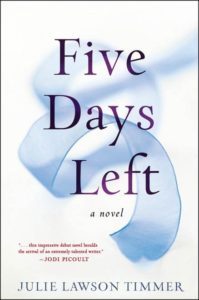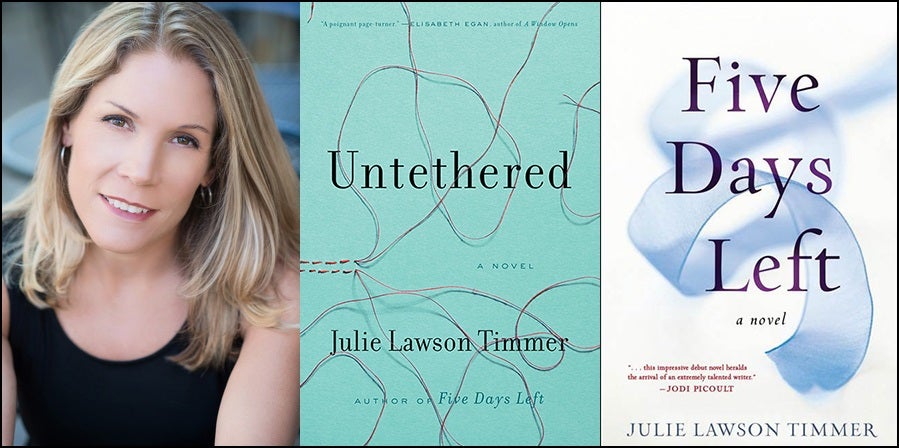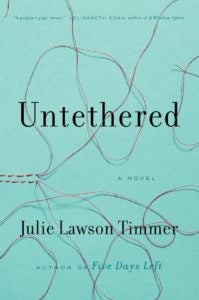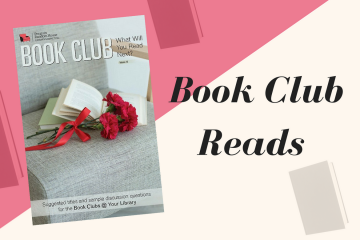Calling all readers! If you haven’t already read Five Days Left by Julie Lawson Timmer, add it to your TBR pile–now! And check out her latest, Untethered, out on June 7th.

Praise for Five Days Left
“This impressive debut novel heralds the arrival of an extremely talented writer.”—Jodi Picoult
Praise for Untethered
“Harper Lee famously wrote that you can choose your friends, but you can’t choose your family. In Untethered, Julie Lawson Timmer makes mincemeat of this old chestnut, proving that a modern family can indeed consist of people who find their own way to each other, however circuitously. The pulse of the story is in the journey, and the triumph is in the unexpectedness of the destination. If you’re inclined to gently strong-arm your book club, Timmer’s is a poignant page-turner worth going to the mat for.”—Elisabeth Egan, author of A Window Opens
And now…a Q&A with Julie Lawson Timmer, author of Five Days Left and Untethered
Q: In UNTETHERED you introduce characters facing devastating loss and impossible choices. What do you think determines whether people cope successfully or fall apart under the strain?
A: I think concentrating on another person could be a key to getting through hardship. We can endure a lot for the sake of someone else. I believe Char rose to the occasion because her focus was on her stepdaughter.
Q: In this portrait of a modern family, a loving stepmother is suddenly widowed and her teenage stepdaughter is forced to move across the country to live with her self-absorbed biological mother. Is there any legal recourse—or preventative measure—that would have provided more options for the teen and the woman who raised her?
A: The reality is that in most cases, stepparents have no legal rights to their stepchildren. The only way for Char to gain legal custody of Allie is for Lindy to voluntarily relinquish her rights to her daughter, something Lindy would never do.
Q: Even in the best of circumstances step parenting can be a delicate balancing act, a subject deftly explored in UNTETHERED. Does your insight come from personal experience?
A: Yes, it does. For almost fifteen years, I have been a stepmother to two as well as a bio mom to two. Although our blended family gets along very well, we have certainly had to navigate some unspoken rules and anxieties that don’t exist in “first families.”
Q: A major issue you shed light on in UNTETHERED is the unregulated and dangerous practice of parents “re-homing” adopted children. Many are not aware that this practice exists. What is “re-homing,” and how does this practice impact adopted children?
A: Rehoming involves adoptive parents giving away their adopted children to strangers. Unlike in a standard adoption, most rehoming transactions don’t involve background checks, case workers or lawyers. Instead, the two sets of parents might exchange only a few messages on a rehoming website before agreeing to meet for a handoff of the child. The impact on the child can be devastating. At worst, the child could end up with “new parents” who aren’t fit to raise children. Even at best, a child passed from one set of parents to the next, after already being given up by his or biological family, may feel very unwanted and rejected.
Q: In subsequent research on the issue, what surprised you most?
A: The most surprising thing to me is that no agency tracks adopted children (whether from overseas or from U.S. foster care or private agencies) to ensure they are okay. This means we really have no idea what has become of these children, and whether they are still with their adoptive families or have been given away. There is a very large crack in the system, and we have no idea how many children have fallen through it.
Q: A recurring theme in your fiction is the dichotomy of love, specifically the idea that sometimes loving someone means we have to hold on, and sometimes it means we have to let go. How do we know which is the right response?
A: I don’t know that any of us can ever say what the right response is for someone else. Something I try hard to achieve in my novels is to present difficult dilemmas without offering any hint of how I think the characters should behave.
Q: As a practicing attorney and novelist, what’s most challenging about switching gears?
A: I find it difficult sometimes to feel creative after a day of practicing law. The law takes a lot of mental energy, and after a particularly busy day at the office, I can find myself without an ounce of intellectual energy left for writing. On those days, I try to tackle a less challenging aspect of writing, like revising a chapter.
Q: When did you first know that you were a writer?
A: I think I’ve always known. I started writing stories at a very young age, and I really never stopped. But it wasn’t until much later that I started dreaming about writing a novel. The year I turned 45, I finally decided it was time to stop dreaming and get to work.
Q: What skills from your legal training do you bring to your fiction?
A: In the law, we learn to outline, to get to the point without rambling, to conduct research, and to set out facts and arguments cogently. But the most useful thing my legal training has brought me is the ability to sit down and knock out words, whether I feel like writing or not. In the law, missing a deadline because you don’t feel like writing is simply not an option. Because of this background, I never find myself staring at a blank screen. When it’s time to write, I write.
Q: What is your writing routine like and how do you juggle it with a family of six and your career as an attorney?
A: I wrote my debut from 4am-6am every day for two years until I had a first draft. Now, I practice law part time and have two or three days each week to write. This allows me to sleep until a far more reasonable hour, which I much prefer!
Q: What words of wisdom would you give an aspiring novelist?
A: I would tell any aspiring writer to be careful of following anyone else’s advice, including mine. Writing is such a personal thing; what works for me might not work at all for someone else. I think we all need to experiment and see what fits us best: outlining or not; writing in the early morning or midday or late at night; writing alone in complete quiet or in a crowded coffee shop; showing others your work or not, etc. There is no “right” way to write; there is only what is right for you. I would take the time to figure out what works for you and stick with it, no matter what others are doing, or telling you to do.











